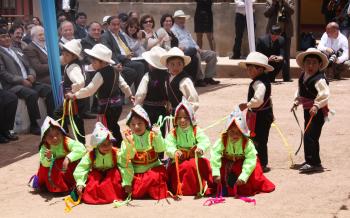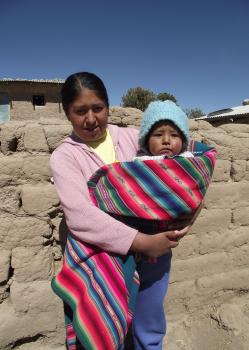In the largest trade centre of the region, many families still live in illegality and poverty

Juliaca is the capital of the Province of San Roman, Department of Puno, in the south of Peru. It is situated 3,825 meters above sea level on the banks of Lake Titicaca. Its main activity is commerce. It has a growing population of over 200,000, the majority of whom live in conditions of poverty, making the region the second poorest in the country.
Thanks to the recent trend towards increased capital investment in Juliaca, the situation has improved slightly for some of its residents. However, a large proportion of people have not benefited from these developments; 42 per cent of Juliaca’s population continues to live in poverty . More than 10,000 homes live in extreme poverty, meaning that several of their basic needs, e.g. nutrition, clean water, health care etc., are not fulfilled. 85 per cent of these children do not have access to education.
Malnutrition and a complete lack of access to health services are no rarity. Often, parents cannot afford to formalise their work or do not hold the necessary qualifications to obtain formal employment. Their children are caught up in this cycle of poverty, missing out on education as they have to contribute to the family income.
Forced child labour and exploitation endanger children and young people
Despite the Peruvian government’s efforts to eradicate the worst forms of child labour, it remains a massive problem in the area. There are numerous informal agencies that post job adverts in the streets seeking children and adolescents for domestic work or waiting tables. Many parents send their children to work in the hope that they will have a better life. However, the children are usually sent to households in other cities, where they are in danger of losing contact with their families and become vulnerable to exploitation. In the worst cases, young girls are sexually exploited.
Support and education for parents are urgently needed so that they no longer find themselves in a position where sending their children off to work for a wealthier family seems like the best future they can provide. In order to break the cycle of poverty, children’s health and education must be ensured.
What we do in Juliaca

SOS Children’s Villages has been working in Juliaca since 2008. An SOS Social Centre provides a holistic and sustainable family strengthening programme, which aims to support children under the age of five and mothers living in extreme poverty. Basic skills training is offered to women from the community to help them improve their income situation. The centre also offers integral health care and measures to improve nutrition and provide clean drinking water. Our organisation also supports parents in preparing their children to start school, and over 500 children and families have already benefited from these efforts.
Children from the area who are no longer able to live with their parents can find a loving home in one of twelve SOS families in Juliaca. Over 100 children live here with their brothers and sisters, affectionately cared for by their SOS mothers.